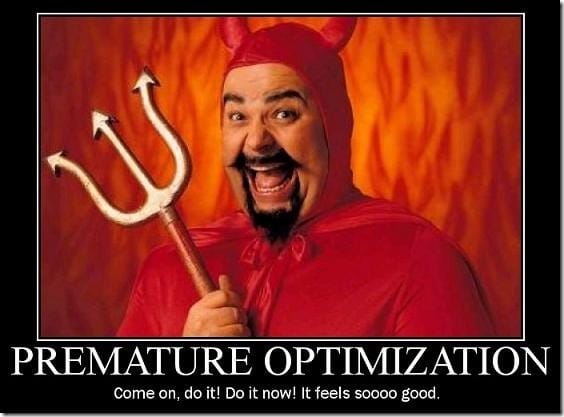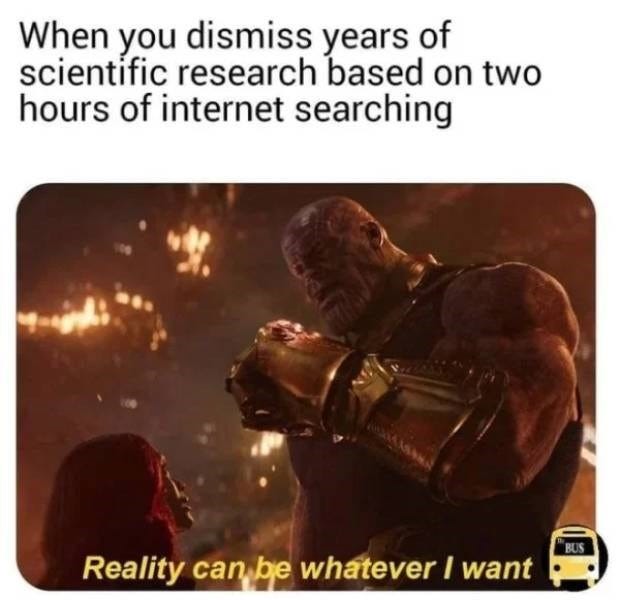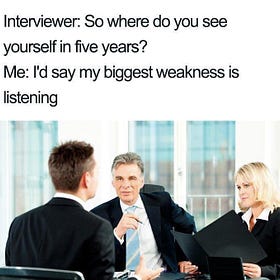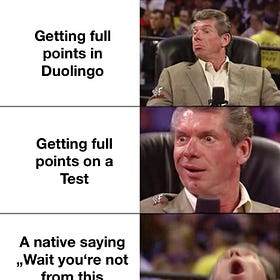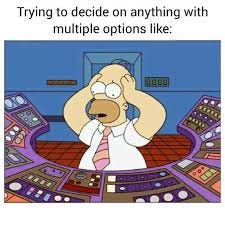Optimization
Holding yourself back
Welcome, aspiring polyglot! Perhaps it is the side of the internet upon which I find myself, but it seems that I cannot get away from the people who are optimizing their routines into stagnation. At a certain point, everything has diminishing returns. Yes, doing what you can to set yourself up for optimized success is important, but not nearly as important as just doing the thing.
Over optimization
Something my students hear from me often is, “the only way out is through.” That is because, well, the only way out of most of your struggles is by getting through them. For the vast majority of situations there is no “magic pill”, no “secret technique”, no “cheat code”. While there are certainly things that can enhance and accelerate your language acquisition, you still have to put in the reps.
Unfortunately, because of the constant optimization seeking that is taking the world by storm, in large part thanks to the internet, too many people are finding themselves spending more time thinking than they spend doing. No amount of “perfect preparation” can beat out someone who shows up every single day and puts in the work without fail.
Another problem many people I meet run into is the idea that, if they wait long enough the perfect moment will find them. Tomorrow is the favorite word of the complacent. At the end of the day, the perfect time to realize your dreams is this very moment. One of the greatest problems with waiting for the perfect moment is that moments are incredibly short lived.
Perhaps you do happen to find the most opportune, most optimized time to dive into your language studies. What then? Do you wait for the stars to align in exactly the same way as they did on your perfect day? How long will that take? Can it happen twice? All of these questions will plague you. Instead, try to remember that any time working towards bilingualism is time well spent.
Science based versus brute force
An interesting phenomenon takes place in academia where people who have an exact science often lose out to people who show up every single day. This is because science is far from exact. All science is limited by what is known and what is known is rarely, if ever, a complete 100% picture. That means people who feel that is to say, treat learning as an art, often have better results.
Most people follow their brain. Totally fine. However, the people I know who make the best decisions and make the largest leaps follow their gut. If something doesn’t work for them, they stop. They don’t try to “science” there way into forcing a square peg into a round hole. Instead they choose to lean on their strengths and maximize gains through minimizing their weaknesses.
Of course, if you have been around long enough, you have doubtless seen me discuss the perils of avoiding weaknesses. If you haven’t, be sure to read this article:
Avoidance isn't resolution
Welcome, aspiring polyglot! The other day I was working with a student and he told me the things he felt he was struggling with and we addressed them. After about 15 minutes I asked him how his writing was coming along. He told me he hadn’t been writing in the past couple of weeks so I asked him to write me some sentences. A few more minutes passed and …
At the end of the day, you can only use what you have. Unfortunately, very few people have the means to take full advantage of the ultimately optimized scientific approach to language acquisition. Where optimization fails, brute force wins. You cannot spend thousands of hours listening to a new language without beginning to understand it. Simply not possible.
Is that the optimal way to do things? Absolutely not. But is it scary effective for those who are willing to try? Without a doubt. Doing what you know works for you is far more important than following an optimization guide. Especially considering that the optimal conditions for one person are more than likely different than the optimal conditions for you. Science requires n=1 approaches.
Getting back to the basics
When searching for a place to start putting those building blocks in place, it is important to consider things that have worked for everyone, even if they suck. One of those things being dictation. The process of transcribing audio from your target language. While possibly one of the worst, most difficult things you can do, it is also the most effective way to train your ear. For more, read this:
The BEST Way to Hone Your Listening Skills
Welcome, aspiring polyglot! An interesting consequence of being an exchange student is that you get to directly compare two different systems. In my case I actually did two years as a senior in high school in two different countries. Furthermore, I experienced private school in Belgium while I attended public school in the US. Both times I was taking Spanish class, something caused by the fact that they wouldn’t let me take English class in Belgium which was less than ideal.
Beyond that, however, you can and should test your own theories. Sometimes the things you think will work for you end up working for you, even if there is no “science” to back up the method. Waiting for someone else to give you permission to act on the things you find useful will cause a near permanent delay in any and all potential progress.
If you truly cannot come up with a methodology that works for you, there is one foolproof way to learn. Irrespective of the science and the opportunities for optimization, there is no way to avoid learning a language that you are actively using. Start reading, writing, speaking, and translating from the very first day.
Even if you only know 5 words, learn 5 more and now you know twice as much as you did. The moments when one sentence is difficult to translate will be rapidly replaced by ones in which one page is difficult, then ten, then fifty, then entire books. A day filled with your target language is a day that does not need optimization because it does not get more optimal than complete immersion.
Conclusion
Over optimization is almost worse than analysis paralysis. Both, however, involve the specter of too many options. What does optimal really mean? Certainly it can’t be universal, can it? If the “optimal” thing doesn’t work for you, does that mean you are broken? Absolutely not! The greatest optimization is the one that is suited to you. For many, that is simply starting and adapting as you go.
An inordinate number of people will use optimization as an excuse to never begin. After all, why would you do something if you aren’t taking advantage of literally every waking moment to its fullest?? But I’ve seen people brute force their way into bilingualism far more often than I’ve seen people optimize their way into it. Instead of waiting for the stars to align, know they are waiting for you.
Requests
If you have anything you would like covered you can reach out to me on X, Instagram, or at odin@secondlanguagestrategies.com.
Additional Resources
Don’t want to spend time playing catch up? Pick up the 3 Months to Conversational book now available on Amazon! 3 Months to Conversational
For more long form content be sure to check out the website and the FREE Language Learning PDFs we have available!
Subscribe for new content on YouTube and TikTok!
Learning Spanish? We have begun aggregating resources in you Spanish Resource Newsletter!
Don’t forget to pick up your very own French Language Logbook or Spanish Language Logbook


